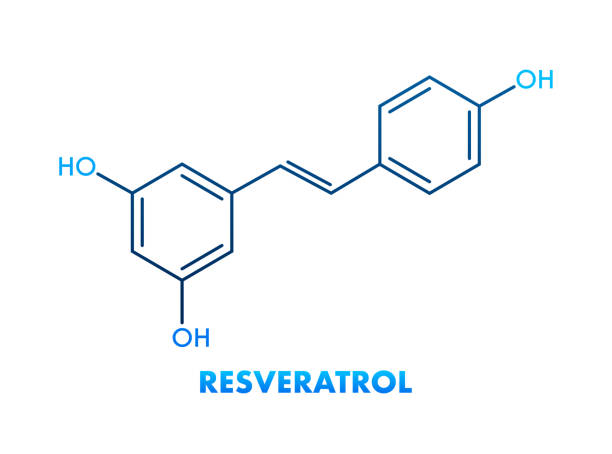
What is Resveratrol? Everything to Know in 5 Minutes
Share
Key Takeaway: Resveratrol, found in red grapes and berries, shows promise for heart health and inflammation reduction.
What Is Resveratrol?
Resveratrol is a natural compound found in red grapes, blueberries, and peanuts. Plants produce it as a defence mechanism when under stress from things like infections or UV exposure. It works as an antioxidant in our bodies, fighting damaging free radicals that contribute to aging and disease. In regards to longevity it's spoken about for its ability to activate proteins called sirtuins, which help regulate metabolism and DNA repair.
Resveratrol is nature's defense compound, produced by plants like grapes and berries to protect themselves—and potentially us too.
How Does It Help Your Body?
Resveratrol may offer several health benefits. It could improve heart health by lowering blood pressure and improving blood flow, potentially reducing heart disease risk. Its anti-inflammatory properties might help with conditions like arthritis and diabetes. Research suggests it may also improve insulin sensitivity, which is important for managing blood sugar levels.

While animal studies show promising anti-aging effects and potential lifespan extension, these findings haven't been firmly established in humans yet. Early research also hints at possible cancer-fighting properties, but more studies with people are needed.
From better heart health to reduced inflammation, Resveratrol offers multiple potential benefits—though human evidence is still developing.
Is It Safe to Take?
Most people tolerate Resveratrol well at doses between 250-500 mg daily. Higher amounts might cause stomach issues like nausea or diarrhea. If you take blood thinners, be cautious as Resveratrol can interact with these medications. Always check with your doctor before starting any supplement, especially if you're pregnant, breastfeeding, or taking other medications.
Resveratrol appears safe for most people at moderate doses, but consult your doctor first—especially if you're on medications.

What Does the Research Say?
Research on Resveratrol continues to evolve. Studies show it may help with several health conditions:
- Heart Health: A 2018 study found it reduced blood pressure in people with hypertension, while other research shows it may improve blood vessel function and potentially lower "bad" cholesterol.
- Inflammation: A 2016 review highlighted Resveratrol's ability to reduce inflammation through various pathways, which could help with conditions like arthritis.
- Diabetes: In 2014, researchers found that Resveratrol improved insulin sensitivity in men with type 2 diabetes, suggesting potential benefits for blood sugar management.
- Ageing: While Resveratrol has extended lifespan in yeast, worms, and mice, human evidence remains limited.
Current research faces challenges with Resveratrol's bioavailability—our bodies metabolise it quickly, reducing its effectiveness. Scientists are exploring new delivery methods like nanoliposomes to improve absorption.
The science shows promise, particularly for heart health and inflammation, but researchers are still working to overcome Resveratrol's absorption challenges in humans. Taking with a soluble fat may help.
Benefits vs. Downsides

Potential Benefits:
- Naturally found in common foods
- May support multiple aspects of health
- Generally well-tolerated at recommended doses
Possible Downsides:
- High doses may cause digestive issues
- Can interact with blood thinners and other medications
- Supplement quality varies since they're less regulated than medications
- People allergic to grapes should avoid it
Resveratrol offers broad potential benefits with minimal side effects for most people, but quality and drug interactions are important considerations.
How Much Should You Take?
While research hasn't established an ideal dose, studies have used amounts ranging from 10 mg to 1,000 mg daily. Many experts suggest 250-500 mg per day based on clinical trials showing benefits at these levels.
There's no definitive best time to take Resveratrol. Some people prefer taking it with meals (especially those containing some fat, which may improve absorption) to avoid stomach discomfort, while others take it at night to align with rest and recovery.
Most studies suggest 250-500 mg daily.

Conclusion
Resveratrol shows promise for supporting heart health, reducing inflammation, and potentially slowing aging processes. While research in humans is still developing, the evidence so far is encouraging. As with any supplement, approach Resveratrol thoughtfully and consult with a GP or healthcare professional, especially if you have existing health conditions or take medications.
If you’re considering exploring Resveratrol’s potential, Healthspan Formula’s Resveratrol is a high-quality option, formulated to support your health journey with trusted ingredients.
Where we got the information for this article
- Health Benefits of Resveratrol Supplements
- Resveratrol: A Double-Edged Sword in Health Benefits
- Resveratrol - Wikipedia
- RESVERATROL: Overview, Uses, Side Effects, Precautions, Interactions, Dosing and Reviews
- What You Need to Know About Resveratrol Supplements
- Diet rich in resveratrol offers no health boost
- Resveratrol: Benefits, Side Effects & Dosage
- Resveratrol benefits, dosage, and more
- Resveratrol | Linus Pauling Institute | Oregon State University
- Health Benefits of Resveratrol — And Should You Take It?
- Resveratrol supplementation improves glycaemic control in type 2 diabetes mellitus
- Resveratrol improves insulin sensitivity, reduces oxidative stress and activates the Akt pathway in type 2 diabetic patients
- Resveratrol reduces blood pressure and improves vascular function in patients with hypertension
- Resveratrol and cancer: a review
- Health Effects of Resveratrol: Results from Human Intervention Trials
- Recent studies on resveratrol and its biological and pharmacological activity
- The therapeutic potential of resveratrol: a review of clinical trials
- Recent advances in oral delivery systems of resveratrol: foreseeing their use in functional foods
- Potential Adverse Effects of Resveratrol: A Literature Review

